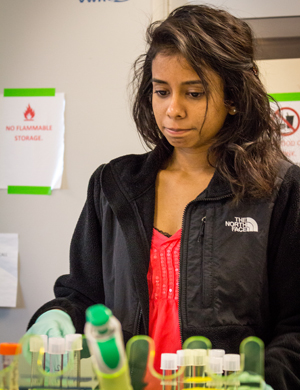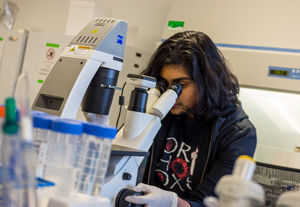Assistant Professor of Biology Megan Povelones is showing her students the practical side of science, working in the lab on real-life science research. The Penn State Brandywine professor and her student team are carrying out a molecular biology study that could help people better understand overall human health and disease.
Molecular biology deals with the understanding of interactions between various parts of the cell, exploring the cell's characteristics and chemical processes.
Povelones explained that what she and her students are most interested in researching is the cell's mitochondria. Mitochondria act as a power producer for the cell, converting energy into usable forms. They play a factor in several diseases such as Alzheimer's, Parkinson's and other illnesses and are a crucial part of overall human health, affecting metabolism, energy production and the ageing process.
"Human cells have many, many mitochondria and there are a lot of complex human diseases that are caused by disruptions in mitochondrial function," Povelones explained. "There are also several genetic mitochondrial disorders."
In the lab, Povelones and her students Marina Mathew and Pallavi Sindhu are currently running tests on a single-celled organism that only has one mitochondrion within each cell, making it simpler to determine what genes might be involved in supporting mitochondrial function.
"If we stumble across a gene product that is doing something really important in these organisms then it could have medical relevance," she explained.
The organisms that the team works with are nonpathogenic to humans and therefore are safe. However, they are closely related to organisms that cause devastating human diseases, such as African sleeping sickness found in sub-Saharan Africa.
"This type of research can affect human health," Mathew said. "When we research small organisms we can learn more about human diseases and help improve the quality of life for people."
 "It's a more hands-on experience," Sindhu added. "We need to be able to gather what we've learned in our classes and apply it to real life. This is a great way to apply your knowledge."
"It's a more hands-on experience," Sindhu added. "We need to be able to gather what we've learned in our classes and apply it to real life. This is a great way to apply your knowledge."
Mathew and Sindhu work in the lab four to six hours per week and earn one credit for their research efforts. Both students plan to transfer to University Park after finishing their sophomore years at Brandywine to complete their degree programs. This is their second semester working with Povelones and they've both been thankful for the unique opportunity.
"The students have done amazingly well," Povelones said. "They've really risen to the occasion and have shown amazing commitment. It's exciting that we can do this with freshmen and sophomore students. A lot of this has been made possible because of the new laboratory space and new equipment that we've gotten as part of the four-year biology major."
Beginning in fall 2014, Penn State Brandywine will offer two different bachelor's degrees in Biology. Find out more about our biology degree programs online.
(caption: Freshman Pallavi Sindhu works on extracting DNA out of bacteria in Brandywine's newly modernized biology lab.)
